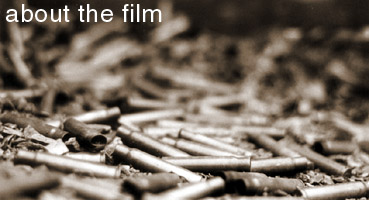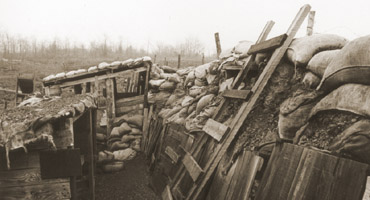
a long journey is now over
"The Truce" is a short film studying the relationship between enemy soldiers during a WWI Christmas Day ceasefire.
"The Truce" was awarded the NYU Wasserman Award for Best Picture, the 2001 Hamptons International Film Festival Student Film Award, the 2002 College Television Award (Student Emmy) for Drama, and a Cine Golden Eagle. The film was a finalist for the Skyy Vodka Short Film Awards and the Angelus Student Film Awards.

christmas day, 1914
At the beginning of
World War I and before the conflict escalated
into the bloodiest war the world had seen, the opposing sides
decided upon rules of conduct for the battlefield. The armies
agreed to call a truce on Christmas. It's been reported that on
Christmas Day on one particular front, the men who had been
shooting at each other just hours before climbed out of their
trenches and met each other at the halfway point in No Man's
Land.
The Germans initiated
this unusual meeting. They crafted
miniature Christmas trees decorated with scraps of metal and
any other makeshift ornament they could find in the trenches.
The trees were placed outside their trench as a symbol of
goodwill. They began to carol the Allies with a rendition of Stille
Nacht. The Allies countered with their own performance of The
First Noel.
A German who spoke
broken English shouted an invitation
towards the Allies to meet halfway between trenches. Moments
later, German and British soldiers who had been killing each
other the day before were fraternizing and milling about the
battlefield as if it were recess. Photographs and newspapers
were exchanged. Chocolate bars were swapped for cigarettes.
British soldiers who had grown sick of their rationed cans of bully
beef eagerly bartered with the Germans for a more pleasing bill
of fare.
The most famous occurrence
of the Truce of 1914 was a pick-up
game of soccer.
Paul Fussell, a noted
historian, is quoted as saying the soccer
game represented the last public moment in which it was
assumed that people were nice, and that the Dickensian view of
the world was a credible one. It was a wonderful ironic moment
where sworn enemies were exchanging cigarettes and
addresses and exchanging insignias, treating each other like
friends. It was the last gesture of the 19th Century idea that
human beings were getting better the longer the human race
went on. Nobody could believe that after the First World War,
and certainly not after the Second.
The idea of soldiers
sojourning from battle to compete in a
soccer game defies logic. But viewed under the lens that the
Great War was soon to become the bloodiest and most
devastating the world had ever seen, we learn that sometimes
the most absurd actions turn out to be the sanest.
